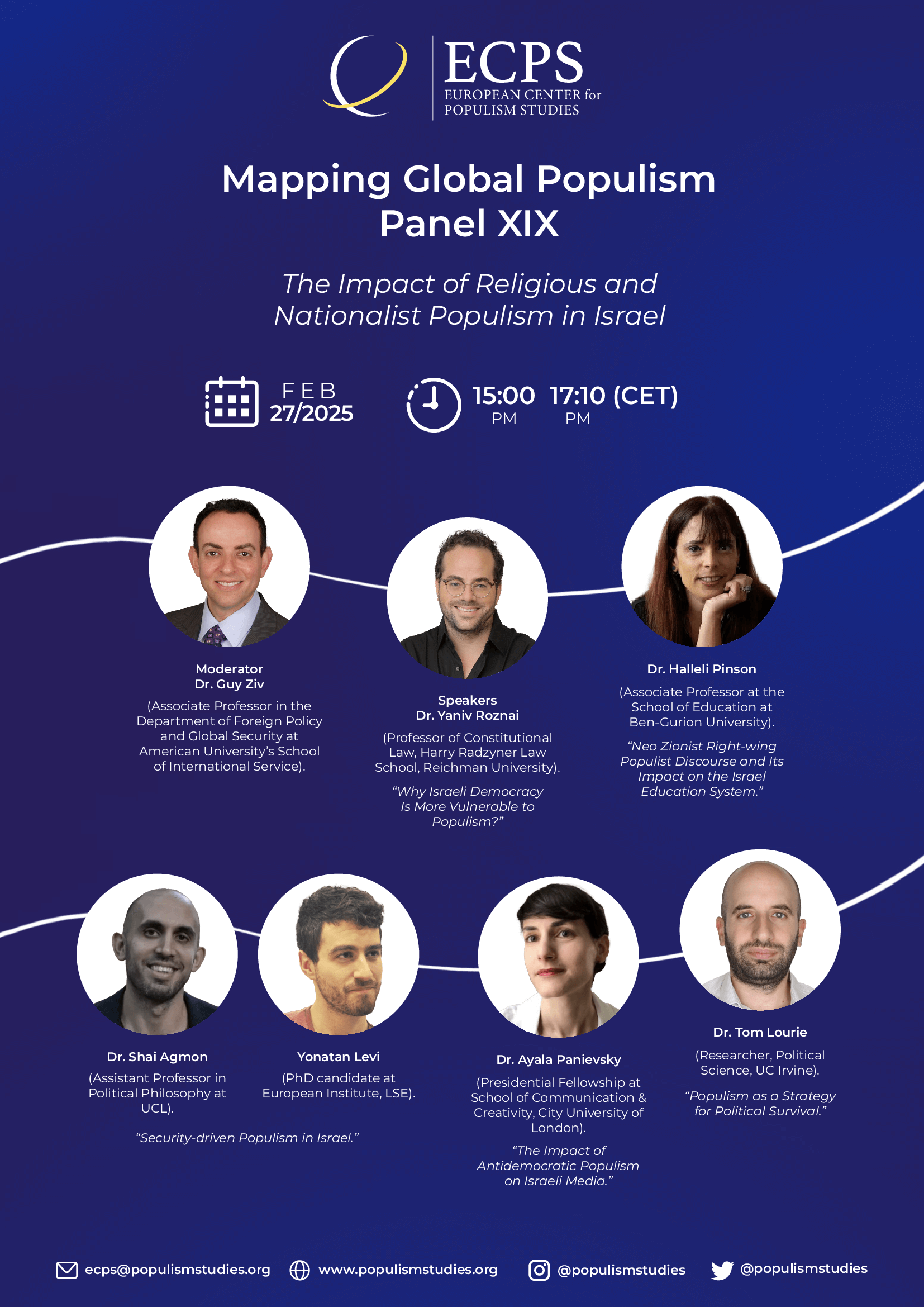Date/Time: Thursday, February 27, 2025 — 15:00-17:10 (CET)
Click here to register!
Moderator
Dr. Guy Ziv (Associate Professor in the Department of Foreign Policy and Global Security at American University’s School of International Service (SIS)).
Speakers
“Why Israeli Democracy Is More Vulnerable to Populism?” by Dr. Yaniv Roznai (Professor of Constitutional Law, Harry Radzyner Law School, Reichman University).
“Neo Zionist Right-wing Populist Discourse and Its Impact on the Israel Education System” by Dr. Halleli Pinson (Associate Professor at the School of Education at Ben-Gurion University).
“Security-driven Populism in Israel,” by Dr. Shai Agmon (Assistant Professor in Political Philosophy at UCL) & Yonatan Levi (PhD candidate at European Institute, LSE).
“The Impact of Antidemocratic Populism on Israeli Media,” by Dr. Ayala Panievsky (Presidential Fellowship at School of Communication & Creativity, City University of London).
“Populism as a Strategy for Political Survival,” by Dr. Tom Lourie (Researcher, Political Science, UC Irvine).
Click here to register!

Brief Biographies and Abstracts
Dr. Guy Ziv is an Associate Professor in the Department of Foreign Policy and Global Security at American University’s School of International Service (SIS). He also serves as the associate director of AU’s Meltzer Schwartzberg Center for Israel Studies. He teaches courses on U.S. foreign policy, international negotiations, U.S.-Israel relations, and Israeli-Palestinian peacemaking. His latest book is titled “Netanyahu vs The Generals: The Battle for Israel’s Future,” published by Cambridge University Press (2024). His first book, “Why Hawks Become Doves: Shimon Peres and Foreign Policy Change in Israel,” was published by SUNY Press in 2014. Dr. Ziv has a background in policy, having worked on Capitol Hill and for not-for-profit organizations that promote Israeli-Palestinian peacemaking.
Why Israeli Democracy Is More Vulnerable to Populism?
Dr. Yaniv Roznai is an Associate Professor and Vice-Dean at the Harry Radzyner Law School, and Co-director at the Rubinstein Center for Constitutional Challenges, Reichman University. He holds a PhD and LL.M (Distinction) from The London School of Economics (LSE). He is the Co-Founder of the Israeli Association of Legislation and was a Co-Chair between 2017-2020. He is an elected board member and former secretary general of the Israeli Association of Public Law. Dr. Roznai’s scholarship focuses on comparative constitutional law, constitutional theory, legisprudence, and public international law.
Abstract: I will explain that compared with other systems, Israeli democracy is especially vulnerable to populism, because of its unique institutional design factors coupled with social factors. Only with understanding these factors can one grasp the risks that the judicial overhaul – a populist project – poses to Israeli democracy.
Neo Zionist Right-wing Populist Discourse and Its Impact on the Israel Education System
Dr. Halleli Pinson (BA, TAU; MPhil, PhD, Cambridge University) is an Associate Professor at the School of Education at Ben-Gurion University. Pinson is a political sociologist of education, and her main interest is with the changing role of schooling in the age of globalization. She has three main research areas: gender patterns of participation in STEM fields; citizenship education and the impact of political populism on education policy; and state education responses to global migration. She is the co-author of Education, Asylum and the ‘Non-Citizen’ Child, and a co-editor of the Edward Elgar Handbook on Education and Migration and the Routledge’s book series on Education and Migration. She is also a member of the editorial boards of the British Journal of Sociology of Education and Race Ethnicity and Education. She is also the former president of the Israeli Comparative Education Research Association and currently serves as the chair of the Global Migration SIG at the CIES.
Abstract: Over the past decades, and particularly since 2009, neo-Zionist discourse has gain prominence in Israel. This approach, which gives preference to the definition of Israel as a Jewish state over and above its definition as a democracy, should be seen as a specific version of religious-nationalism and an expression of authoritarian populism. This paper explores how educational discourses and policies changes in Israel are being shaped by right-wing populist organization and politicians. This presentation focuses on three examples from recent years. The first example, the campaign to ban the activist groups ‘Breaking the Silence’ – a group of army veteran who collect testimonies on Israel’s misconducts in the occupied territories – from entering schools. The second example is the case of ‘Im Tirtzu’, a right-wing organization, and their campaign against left-wing influences in the academy by employing practices, such as online anonymous reports on ‘left-wing biased teaching’. A third example is the recent attempts to change the Council of Higher Education bill, what is referred to as ‘the silencing bill’, aimed at silencing critical voices in academia under the face of the ‘fight against terrorism.’ In examining these cases I will demonstrate how right-wing organizations and politicians employ different populist strategies and how they impact education institutions and policies.
Security-driven Populism in Israel
Dr. Shai Agmon is the Rank-Manning Junior Research Fellow at New College, University of Oxford. His research lies primarily in political and legal philosophy, on topics ranging from the philosophy of competition to political authority and the moral limits of markets. additionally, he writes on issues in contemporary Israeli politics – mostly focusing on the relation between the illegal settlements project and Israel’s national security, and the rise of Israeli right-wing populism. His academic work has appeared in Ethics; Politics, Philosophy & Economics; The Journal of Ethics and Social Philosophy and Contemporary Politics. He also writes for Haartez, Ynet, Telem Magazine and more. Shai also has a rich experience in politics and public policy. Amongst other things, he was a Campaign Manager in the 2019 primaries for the Israeli Labour Party leadership; lead negotiator of the Green Party during the establishment of the Democratic union Party; policy advisor at the ‘first 100 days’ team of Blue and White Party; Political Officer for the British Ambassador in Tel-Aviv; and an Articled Clerk at Israel’s Attorney General Office in the Department of Fiscal and Economic Matters.
Yonatan Levi is a PhD candidate specialising in millennial politics. His doctoral project is a comparative analysis of the generational politics of millennials in the United States and Israel over the last decade. He is particularly interested in the ways in which his generation understands and approaches power, politics and organisation. Prior to his doctoral studies, Yonatan worked as a journalist for Israel’s leading daily newspaper, an investigative researcher for a Jerusalem-based progressive think tank, and a political campaigner. In 2011 he was one of the leaders of the Israeli social justice protest movement – the largest civic mobilisation in the country’s history. In 2016 he worked in the UK Parliament. Yonatan is a recipient of the British Foreign Office’s Chevening Scholarship for students with outstanding leadership qualities, as well as NYU’s Paths to Peace Scholarship. He is a research fellow at Molad – the Centre for the Renewal of Israeli Democracy, and at the Israeli Labour Movement’s Berl Katznelson Centre. His writing has appeared in various media outlets, including The Guardian, Ha’aretz and Contemporary Politics. Yonatan holds an MSc in Political Theory from LSE and a BA in History and Literature from Tel-Aviv University.
The Impact of Antidemocratic Populism on Israeli Media
Dr. Ayala Panievsky is currently a Presidential Fellow in the Journalism Department at the City University of London, a Research Associate at the Sociology Department at the University of Cambridge, and a Research Fellow at the Centre for the Renewal of Israeli Democracy. She is a researcher specialising in media under attack, right-wing populism, and democratic backsliding. Her research appeared in journals such as The International Journal of Press/Politics and Digital Journalism, and featured in media outlets like the BBC, The News Agents, LBC and ABC.
She holds a PhD (no corrections) from Cambridge University, an MPhil in Political Communication (with distinction) from Goldsmiths College, and a BA in Journalism and Communication (with distinction) from the Honours Programme at the Hebrew University of Jerusalem. Her work received the ICA Outstanding Dissertation for 2024, the 2023 IJPP Best Article of the Year Award, and an honourable mention by the 2023 ICA Wolfgang Donsbach Outstanding Article of the Year Award, among others.
As a former journalist, she works with journalists worldwide to improve the future of news in times of sophisticated threats to democracy, equality, freedom, and justice. Her first book, The New Censorship, will be out next year with Footnote Press.
Populism As a Strategy of Political Survival
Dr. Tom Lourie holds a PhD in political science and is a research fellow at the Ethics Center at the University of California, Irvine.
Abstract: Conventional wisdom suggests that populism in Israeli politics dates back to the 1970s, portraying Likud as a populist party and its founder, Menachem Begin, as Israel’s first populist prime minister. However, evidence indicates that populism at the executive level is a relatively new phenomenon in Israel. Content analysis and case studies of Israeli prime ministers from 1977 to 2023 suggest that Benjamin Netanyahu was the first to adopt a populism, doing so during the 2015 election campaign. Process tracing further reveals that Netanyahu employed populism as a strategy for political survival in response to his legal troubles. As part of this approach, he systematically targeted institutions involved in his legal proceedings, raising concerns about its implications for Israeli democracy.


